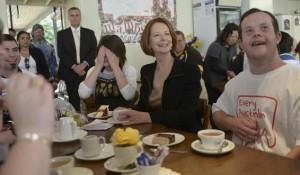A lot of interest was inspired by an ABC Ramp Up blog written by Kate Larsen, former head of Accessible Arts Australia who stirred the pot by criticising the Every Australian Counts / NDIS campaign as too tame and driven by non-disabled people.
In her blog she describes the nationwide DisabiliTEA morning teas as having “passive, doily laden’ aesthetic.”
According to Larsen this aspect of the campaign “smacks of mediocriTEA rather than the pride, power and rights-driven agenda that we (as people with and without disability) should be setting.” She explains that she yearns for direct action as seen overseas – people dragging their bodies up the steps of Parliament and chaining themselves to buses.
The blog post drew a mixed and passionate response and inspired follow-up media coverage.
We don’t claim to understand what it is like to live with a disability (though we’ve met more people with a disability and carers than most) but we do understand disabilities and nonprofit campaigning very well and have a few thoughts:
1. It is entirely unfair to highlight one aspect of a national, long-running campaign and claim it is representative of the whole. The DisabiliTEA part of the campaign must be viewed against the website, lobbying and more. We have written previously of the strong approach the campaign has displayed.
The DisabiliTEA may be sweet and non-threatening but it’s also a raging freakin’ success. 1700 such twee celebrations were held around the nation – 1700! That is the sign of a campaign that is working on many levels. Is the campaign out of touch or are its critics?
The morning teas may be olde worlde to the hip but to many people they will be a rare social occasion and a chance for softer supporters to feel that they are a part of something. You know – the sort of people who have cared for a disabled son or daughter since before The Big Day Out was invented. The sort of people with disabilities who can’t drag themselves up the steps of Parliament because they have errands to run in the far flung suburbs with no microbreweries.
2. To have brought DisabiliTEA publicly into question is self-inflicted injury. Disunity is death.
3. Smart and passionate campaigners are in short supply. Larsen argues that people with disabilities should lead disability organisations. This is a luxury that we cannot afford. Gather 100 campaigners / marketers, send 70 of them away. You are now left with the 30 smart, passionate ones. Of that 30, keep the ones who want to work in the nonprofit sphere. You are left with perhaps 5. Now ask them if they want to work in disabilities – as opposed to environment, green energy, leftie politics or the arts. How many do you have left? Can we really discriminate against any campaigner just because they don’t have a disability?
4. Larsen and many who share her view would like people with a disability fronting campaigns such as Every Australian Counts. Here’s an inconvenient truth. When people without disabilities see a people with disabilies talking on the TV about disability issues they conveniently conclude that the matter being discussed is a “Disabled” issue and not of interest to them. This doesn’t help the cause. Let us be clear: we are NOT, NOT, NOT suggesting that people with disabilities are unsuitable to front campaigns.
Disabilities as an issue must be mainstreamed – just like marriage equality, depression, child sexual abuse, problem gambling and all the other issues that have been stealing the spotlight from disabilities for decades. It’s only in the last two years that NDIS has placed disabilities on the agenda at all. 1981′s International Year of Disabled Persons is a long time ago and frankly since then many issues have leapfrogged disabilities.
5. Every issue has a different dynamic. Having worked with 300+ nonprofits across just about every sector we witness varying degrees of passion around issues. Environment, marriage equity and animal welfare issues have loud, proud and vocal campaigners by the score. Disabilties is not such a sector.
Yes there are plenty of passionate people but per capita people affected by disabilities are too busy living their lives under great pressure to place pressure on government. This is changing but without a central, campaign-orientated body to guide the troops disabilities as an issue will continue to flounder. Every Australian Counts is bringing people together more effectively than any of the long-standing peaks and providers ever have. 133,000 supporters? That is outstanding. Again – NDIS must be doing something right.
6. Whatever we do we must NOT alienate carers.
By the way other causes to show a lack of spirit include TAFEs, students and parents using state education, seniors and Catholics appalled at the behaviour of their clergy. Each of these causes should be able to garner similar support – but they can’t. They aren’t organised. They have no central campaigning body such as NDIS / Every Australian Counts. Or maybe they aren’t that angry.
*Disclosure: Hootville spends most of its days also wishing that nonprofit causes were tougher, louder, more organised and dramatic. We have felt frustrated at the lack of progress and action on the part of people affected by issues such as disabilties, mental health, urban planning, sexual servitude and then some. We have been staggered at the lack of spine displayed by some providers, peaks and campaigners but we know that it takes more than stunts to create change.
Kate you are very welcome to this space for a reply.


